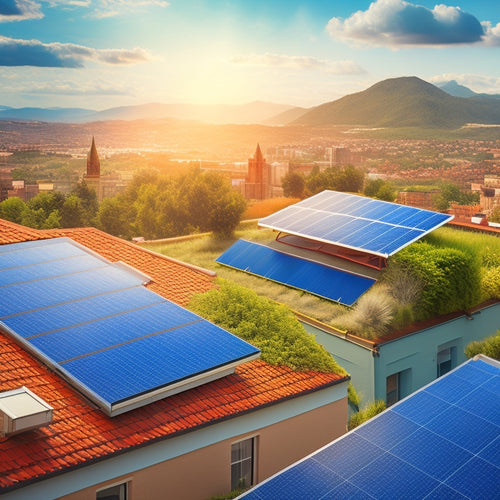
Why Eco-Friendly HVAC Systems Transform Modern Homes
Share
As you're investing in an eco-friendly HVAC system, you're not only minimizing your home's environmental impact but also improving your living space through advanced technologies and sustainable solutions. With smart thermostats and intelligent climate control, you'll optimize energy management and reduce waste. Green HVAC system options, like geothermal and solar cooling, provide innovative solutions for a more sustainable future. Automation and energy storage guarantee a stable power supply, while advanced technologies like predictive maintenance and machine learning enhance system efficiency. By adopting these eco-friendly solutions, you'll convert your modern home into a comfortable, sustainable, and environmentally responsible space - and there's even more to investigate in the world of eco-friendly HVAC systems.
Key Takeaways
- Eco-friendly HVAC systems reduce greenhouse gas emissions and contribute to a comfortable and sustainable living space.
- Smart thermostats and intelligent climate control optimize energy consumption patterns, leading to lower utility bills and enhanced comfort levels.
- Energy-efficient upgrades can increase property value, improve air quality, and provide cost savings of up to 30% on energy bills.
- Advanced technologies like predictive maintenance, machine learning, and real-time monitoring ensure optimal system performance and minimal downtime.
- Green HVAC system options like geothermal, solar cooling, and high-efficiency heat pumps offer sustainable and environmentally friendly solutions for modern homes.
Smart Thermostats for Energy Efficiency
When it comes to maximizing energy efficiency in your HVAC system, one essential component stands out: the thermostat. A smart thermostat is key to smart energy management, allowing you to optimize your heating and cooling usage.
With programmable features, you can set schedules for when you're away or sleeping, reducing energy waste. Additionally, incorporating renewable energy sources, such as solar-powered fast charging, into your home's energy infrastructure can further reduce your carbon footprint.
You can also adjust the temperature remotely, ensuring your home is comfortable when you return. By installing a smart thermostat, you'll have greater control over your energy consumption, reducing your carbon footprint and saving on utility bills.
Optimizing HVAC With AI Technology
Harness the power of artificial intelligence (AI) to revolutionize your HVAC system's performance. By integrating AI technology, you can optimize your system's efficiency, reduce energy consumption, and lower your energy bills. AI-powered HVAC systems can learn your schedule and preferences, adjusting the temperature and airflow accordingly.
| Feature | Benefit | Description |
|---|---|---|
| Predictive Maintenance | Reduced Downtime | AI algorithms detect potential issues before they occur, allowing for proactive maintenance. |
| Machine Learning | Improved Efficiency | AI learns your usage patterns, optimizing the system for maximum energy savings. |
| Real-time Monitoring | Enhanced Control | AI-powered systems provide real-time monitoring, enabling you to adjust settings remotely. |
Green HVAC Systems for Homes
When it comes to your home's HVAC system, you're likely looking for ways to reduce your environmental impact while keeping your energy bills in check.
You'll want to focus on energy efficiency, exploring eco-friendly system options that not only minimize your carbon footprint but also provide long-term cost savings.
By making informed choices, you can create a more sustainable and comfortable living space that benefits both you and the planet.
In addition, incorporating renewable energy systems, such as fuel cost reductions, can lead to significant savings and a reduced reliance on fossil fuels.
Energy Efficiency Matters
You're likely no stranger to the importance of energy efficiency in your home, especially when it comes to your heating, ventilation, and air conditioning (HVAC) system. As a homeowner, you understand the impact of energy consumption on your wallet and the environment. By adopting sustainable practices, you can considerably reduce your energy bills and carbon footprint. Energy conservation is key to creating a more eco-friendly home.
| Benefits | Description |
|---|---|
| Cost Savings | Reduce energy bills by up to 30% |
| Environmental Impact | Lower greenhouse gas emissions and carbon footprint |
| Increased Property Value | Enhance your home's value with energy-efficient features |
| Improved Air Quality | Breathe easier with a well-maintained HVAC system |
| Government Incentives | Take advantage of tax credits and rebates for energy-efficient upgrades |
Eco-Friendly System Options
Your HVAC system is the heart of your home's comfort, and choosing an eco-friendly option can greatly reduce your environmental impact. You have several options to evaluate when it comes to green HVAC systems for homes.
As the world shifts towards sustainable electrification, incorporating renewable energy sources like solar power solar panels can considerably reduce carbon footprints and support climate action initiatives. Furthermore, energy storage systems guarantee a stable power supply, making it an essential component of modern eco-friendly HVAC systems.
-
Geothermal Heating and Cooling: This system utilizes the natural heat of the earth to provide warmth in the winter and cooling in the summer.
-
Solar Cooling Systems: These systems use solar panels to generate electricity, which is then used to power an evaporative cooling system or a heat pump.
-
High-Efficiency Heat Pumps: These systems use advanced technology to provide both heating and cooling while minimizing energy consumption.
Reduced Carbon Footprint
Switching to eco-friendly HVAC systems can drastically slash your carbon footprint, and it's high time you did. You'll markedly reduce greenhouse gas emissions, contributing less to climate change.
In addition, incorporating renewable energy solutions, such as solar panels on fleet vehicles, can further minimize your environmental impact. Eco-friendly HVAC systems incorporate sustainable building materials, minimizing waste and pollution.
By choosing systems with high energy efficiency, you'll lower your energy consumption, reducing your reliance on fossil fuels. Implementing carbon offset strategies, such as offsetting emissions from system production, further minimizes your impact.
With eco-friendly HVAC systems, you're not only reducing your carbon footprint but also creating a healthier, more sustainable living space. By making this switch, you're taking an essential step towards a greener, more environmentally conscious lifestyle.
Energy Savings Through Automation
As buildings become increasingly connected, automation plays a critical role in optimizing HVAC systems for energy efficiency. By automating your HVAC system, you can reduce energy consumption and lower your utility bills.
Furthermore, integrating solar energy into EV charging stations reduces grid reliance, which can be an important lesson for HVAC systems as well.
-
Demand response: Your HVAC system can adjust its energy usage in real-time based on grid demand, reducing peak energy consumption and avoiding brownouts.
-
Energy forecasting: Advanced algorithms predict your energy needs, allowing your HVAC system to optimize energy usage and reduce waste.
-
Optimized scheduling: Automated schedules guarantee your HVAC system operates at maximum efficiency, using the least amount of energy necessary to maintain a comfortable temperature.
The Future of Sustainable Heating
Heat pumps are emerging as an essential component of the future of sustainable heating, ready to change the manner in which buildings regulate their temperatures. As you consider upgrading your HVAC system, you'll want to investigate options that utilize renewable energy and incorporate sustainable materials. This shift will not only reduce your carbon footprint but also provide long-term cost savings.
| Technology | Benefits |
|---|---|
| Heat Pumps | High efficiency, low emissions |
| Solar Thermal | Renewable energy, reduced grid dependence |
| Biomass Boilers | Carbon neutral, sustainable fuel source |
| Radiant Floor Heating | Energy efficient, comfortable temperature control |
| Smart Thermostats | Optimized energy use, remote monitoring |
Intelligent Climate Control Solutions
Three key aspects of intelligent climate control solutions - automation, integration, and optimization - are revolutionizing the way you manage your indoor climate.
You can enjoy a seamless and efficient experience with smart home integration, where your HVAC system syncs with other devices to create a perfect balance of comfort and energy savings.
Climate monitoring is also enhanced, allowing you to track and adjust your system's performance in real-time.
Here are three ways intelligent climate control solutions benefit you:
-
Precise temperature control: You can set specific temperature zones and schedules to guarantee your home is always comfortable when you need it to be.
-
Energy efficiency: Intelligent systems optimize energy consumption, reducing waste and saving you money on your utility bills.
-
Remote access: You can monitor and adjust your climate control system from anywhere, giving you complete freedom and flexibility.
Frequently Asked Questions
Can I Install an Eco-Friendly HVAC System in an Existing Home?
You can install an eco-friendly HVAC system in your existing home, but be prepared to tackle installation challenges. Focus on energy efficiency by upgrading insulation, sealing ducts, and choosing the right system for your home's unique needs.
Are Eco-Friendly HVAC Systems More Expensive Than Traditional Ones?
You're worried that eco-friendly HVAC systems will break the bank, but surprisingly, they're only 10-20% more expensive upfront. However, you'll reap long-term savings through reduced energy consumption, making the cost comparison a no-brainer for the freedom to live sustainably.
Do Eco-Friendly HVAC Systems Require More Maintenance Than Traditional Ones?
You'll find that eco-friendly HVAC systems don't necessarily require more maintenance than traditional ones; in fact, their higher quality components often lead to lower maintenance frequency, resulting in extended system longevity and more freedom from repair hassles.
Can I Get Rebates or Incentives for Installing Eco-Friendly HVAC Systems?
You'll be thrilled to know that 30% of US homeowners can claim a $300 rebate on eco-friendly HVAC systems! You can also investigate federal tax incentives, such as the Energy Star program, and state-specific rebate programs to maximize your savings.
Are Eco-Friendly HVAC Systems Compatible With Solar Power Systems?
You'll be pleased to know that eco-friendly HVAC systems are indeed compatible with solar power systems, offering enhanced solar compatibility and energy efficiency, allowing you to capture free energy and reduce your carbon footprint.
Related Posts
-

Why Choose Recycled Paper for Earth-Conscious Business?
By choosing recycled paper, you'll greatly reduce your business's environmental impact. You'll lower your carbon foot...
-

Why Choose Solar Composting Toilets for Your Home?
By choosing a solar composting toilet for your home, you'll greatly reduce your environmental impact, slashing your w...
-

What Roofing Materials Best Protect Our Planet?
As you consider the environmental impact of your building, you're likely to find that the roofing material you choose...


